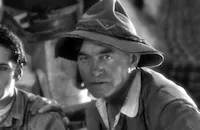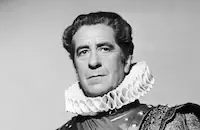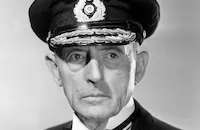Sutter's Gold
Cast & Crew
James Cruze
Edward Arnold
Lee Tracy
Binnie Barnes
Katharine Alexander
Montague Love
Film Details
Technical Specs

Synopsis
When Johan Sutter is falsely accused of murder in 1833 in his native Switzerland, he leaves his wife Anna, daughter Annaliese and son Johan, Jr. for America. He is immediately offered a job as a cable car driver in New York, but both he and Pete Perkin, who was hired with him, are beset by strikebreakers and are hospitalized. While recuperating, Johan decides to go to California, which has been described to him as paradisial, and upon his release, he and Pete head West. For two years they run a successful general store in Missouri until they have saved enough money to continue their travels. Pete reluctantly follows Johan to Vancouver, where they board Captain Kettleson's California-bound ship just in time to avoid being trapped in wintery Canada. The ship stops first in the Sandwich Islands, where King Kamehameha treats Kettleson, Pete and Johan to a feast, after which Pete decides to stay. Back on the ship, Johan discovers that Kettleson has secretly taken over two hundred Kanakas as slaves. Johan tries to get off the ship, but Kettleson takes him hostage, and when Pete decides to return, Kettleson holds him and steals their savings. Upon running out of water, the crew mutinies and shackles Kettleson and the first mate. Johan takes over as captain, frees the slaves, and gives everyone a last sip of water. The ship arrives on the coast of California, where Johan immediately makes himself known to General Juan Bautista Alvarado, who arranges for Johan and the Kanakas to settle the land around Fort Ross to dissuade the Russians from taking the land. Johan names the colony New Helvetia, but after three years without money for supplies, the colonists face starvation. Just in time, Russian General Rotscheff offers to sell Johan his fort, ship and farm animals, in exchange for yearly payments. Johan completes the deal and makes the acquaintance of beautiful English-born Countess Elizabeth Bartoffski. She helps him herd the animals to the settlement, and then promises to follow his career when she is back in Russia. The colony flourishes, and eventually Johan takes final ownership of Fort Sutter. Having grown bored with the life of Russian royalty, Elizabeth visits Johan in California. He falls in love with her and proposes, but Pete protests that Johan has a wife and children and warns him that Elizabeth is only after his wealth. Johan refuses to listen, and Elizabeth stays on until gold is discovered on the land and he is robbed of everything by greedy prospectors. Elizabeth leaves Johan, who then becomes destitute until his wife and grown children arrive, having been summoned by Pete. Anna dies shortly thereafter from tropical fever, but has bound Johan to a promise to fight the loss of his land and finish New Helvetia. After many years, Johan's lawyer son, Johan, Jr., wages a court battle to reclaim his father's land. During this time, Annaliese becomes engaged to Juan Bautista Alvarado, Jr., and when Juan is fired upon because of Johan's land fight, Johan sends them out of the country for their own protection. During Johan's Admission Day speech in San Francisco, it is announced that the Supreme Court has returned Johan's land to him. The crowd of landowners riots, and Johan, Jr. is shot and killed, just as another announcement comes that the Supreme Court has reversed its decision in favor of the prospectors. Johan is mortified that the greed of the people has caused his son's death and vows to fight them for the rest of his life. By 1876, however, Johan is an elderly man waging a lost battle in Washington, with his faithful companion, Pete, by his side. One day in a park, some newsboys shout jokingly that Congress has awarded Johan his land. He rushes to the Capitol, where he buys a paper and reads the truth, that Congress has adjourned. Johan collapses on the Capitol steps and dies.

Director
James Cruze
Cast

Edward Arnold

Lee Tracy

Binnie Barnes

Katharine Alexander

Montague Love

Addison Richards

John Miljan

Harry Carey
William Janney
Nan Grey

Robert Warwick
Morgan Wallace
Allen Vincent
Mitchell Lewis

Frank Reicher
Harry Stubbs

Harry Cording
William Gould

George Irving
Gaston Glass

William Gilbert
Joanne Smith
Ronald Cosbey

Billy Gilbert
Aura De Silva
Sidney Bracey

Bryant Washburn
William Ruhl
Pedro Regas

Russell Hopton
John King
George Lloyd
Walter Long
Ed Brady
John Bleifer
Russ Powell
Jim Thorpe
Paul Weigel
Priscilla Lawson
Jose Rubio
Oscar Apfel
Albert J. Smith
Neely Edwards
Charles Farr
Don Briggs
Clarence H. Wilson
Tommy Bupp
Crew
Jack Boyle
Brymer
Philip Cahn
Morree Clark
Camille Collins
Albert S. D'agostino
Tito Davison
Gene Fowler
Fred Frank
John P. Fulton
Edmund Grainger
Dr. L. Gutstein
Vernon Keays
Jack Kirkland
Gilbert Kurland
Carl Laemmle
Carl Laemmle
George O'neil
Jimmy Phillips
Maurice Pivar
William Reiter
George Robinson
Franz Waxman
Walter Woods

Film Details
Technical Specs

Quotes
Trivia
This was reportedly Universal's biggest box office disaster of the era. It cost $2,000,000 in 1936 when the typical Universal production cost about $100,000.
Notes
Although Sutter's first name is generally spelled "Johann," onscreen credits list it as "Johan." Correspondence in the MPAA/PCA files at the AMPAS Library reveals that as early as 1928, Universal was considering a production based on the life of Johann Sutter, although at that time, there was some concern that their production would be too similar to the 1929 M-G-M film Tide of Empire, which was also concerned with the gold rush of 1848 (see AFI Catalog of Feature Films, 1921-30; F2.5718). According to modern sources, in 1930, Sergei Eisenstein chose the story of Johann Sutter to be one of his early projects with Paramount, after his plans for another film, The Glass House, fell through. Using Blaise Cendrars' novel as his foundation, Eisenstein added to the story with research from other materials, including a personal tour of Sutter's original land in northern California, according to modern sources. The project was shelved, however. Universal's interest in the story apparently continued, as evidenced by a 1931 letter in the MPAA/PCA files to the MPPDA. The letter, authored by the Society of California Pioneers, protested the proposed Universal production, as it was their contention that Blaise Cendrars' novel was "full of historical inaccuracies, besmirching the name and character of both General John A. Sutter and James W. Marshall."
The project was not taken up again until 1934, when, in a July news item, Hollywood Reporter reported that Howard Hawks was to direct a version of it for Universal with a screenplay by William Faulkner. According to a 1935 Hollywood Reporter news item, however, William Anthony McGuire was to prepare a treatment in June 1934. Although there was no mention of an alteration of the Hawks directorial assignment, in August 1935, Universal considered assigning William K. Howard to direct the film. Howard, however, was already committed to another film. Hollywood Reporter notes in August 1935 that producer Edmund Grainger went searching for locations in Northern California, and production was expected to begin September 1, 1935 with Hawks directing. In the Universal shooting schedules at the USC Special Collections Library, Hawks is credited with direction along with James Cruze, and Hawks and William Faulkner are included among the writers of this production. The exact nature of Hawks's and Faulkner's contribution to the final film has not been determined. Although the Hollywood Reporter review gives adaptation credit to Gene Fowler, pre-release studio correspondence in the Screen Achievements Bulletin questions, rather than confirms, this credit. In addition, a letter from writer Walter Woods in the Screen Achievements Bulletin file at the AMPAS Library indicates that while he used various historical reference works, he, personally, did not use any specific incidents from Cendrars' novel.
An unidentified news item dated December 15, 1935 noted that 250 Hawaiian extras were hired for this film. According to correspondence in the MPAA/PCA collection, although the AMPP felt that the script conformed to the requirements of the Production Code, they recommended that Universal take "care with the portrayal of the Mexicans in this picture, to avoid burlesquing them and thus causing an unfavorable reaction in Mexico and other Spanish American countries." Further correspondence reveals that in September 1936, "all the sequences dealing with Mexico and Mexicans and the annexation of California by the United States" were eliminated before submitting the film to the Mexican Board of Censors, "since this fact still remains a sore spot with the Mexican people." The film was passed by the censors. A March 1936 article in Hollywood Reporter notes that the picture's world premiere was held in Sacramento, where a parade was held featuring 5,000 citizens in period costumes, Carl Laemmle, twenty-nine Universal actors and studio personnel, Governor Frank Merriam of California and Sacramento mayor Arthur Ferguson.
A 1935 news item in Daily Variety reports that Luis Trenker, a director with German Roto Films of Berlin, photographed backgrounds of Northern California for a German-language version of Sutter's Gold, called Der Kaiser von Kalifornien (The Kaiser of California). The German production was written and directed by Luis Trenker, photographed by Albert Benitz and Heinz von Jaworsky, and starred Luis Trenker and Viktoria v. Ballasko. The German film won an award in the Mussolini Competition for Best Foreign Film at the 1936 Venice Film Festival. According to a modern source, however, Allied forces later forbade the exhibition of the film in Germany.












